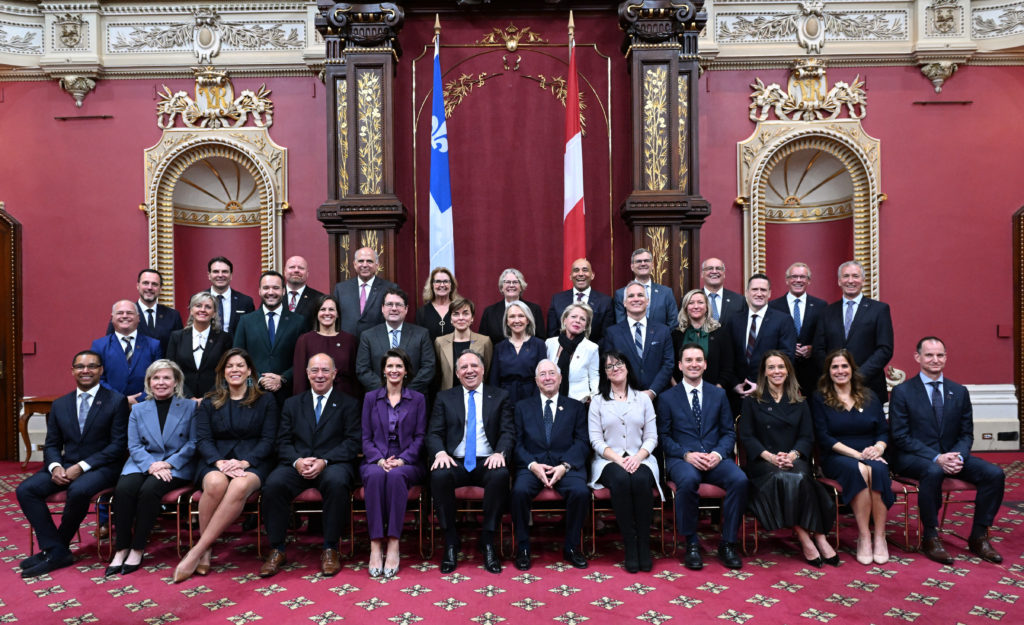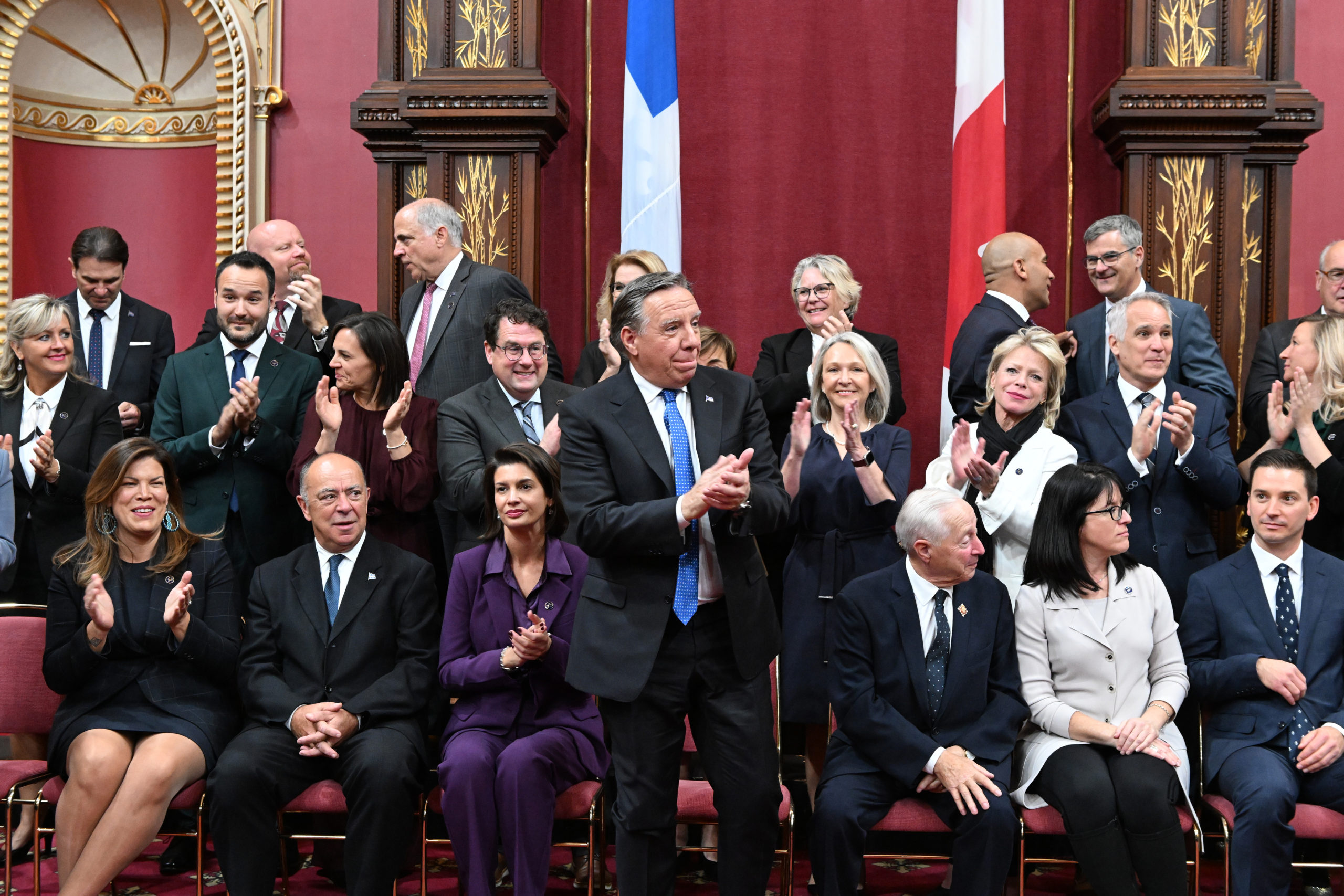On Thursday Quebec Premier François Legault introduced his new cabinet, ahead of the start of the legislative session of the National Assembly in Quebec City.
The new Quebec cabinet is comprised of 30 ministers, up from 26 in the previous session with 10 new ministers, including 14 women and 16 men. Legault emphasized that ‘’education remains his highest priority’’. Energy transition is another key element of the priorities for the upcoming legislative session, and Premier Legault will chair a new Economy and Energy Transition committee supported by the Ministers of Finance, Environment, Indigenous Affairs, Economy, innovation and Energy and the CEO of Hydro-Québec.
Geneviève Guilbault stays as deputy premier but will also take on the role of minister of Transport, she had previously also held to public security portfolio. Katerie Champagne Jourdain, the first Indigenous MNA, has been named minister of employment. François Bonnardel takes over as minister of public safety.
As previously announced by the premier, Christian Dubé remains in the role of minister of Health and Social Services. The government remains focused on health care system and COVID recovery as a top priority.
Also staying in their roles are Eric Girard as minister of finance, Benoit Charette as minister of environment adding climate change and wildlife and Simon Jolin-Barrette as minister of justice.
One of the surprise changes to Legault’s cabinet has been Pierre Fitzgibbon becoming the minister of economy, innovation, energy and regional economic development and the minister responsible for metropolitan Montréal. Newly elected MNA Maïté Blanchette will oversee a newly created portfolio as minister of natural resources and forests as will fellow rookie MNA France-Elaine Duranceau who will be minister of housing.
Government priorities
- Education remains Legault’s top priority since his election in 2018. He stated that in the upcoming session he will not deviate from this commitment, focusing on modernizing schools, supporting students and youth, and developing skills and training programs to combat labour shortages.
- Health reform will be top of mind for Premier Legault with the support of Minister Dubé at Health. The leaders’ debates opened the discussion for more participation of the private sector in Quebec’s healthcare system, which represents almost half of the provincial budget.
- The economy, affordability and the rising cost of living are very present in the minds of Quebeckers. The need for cost controls, coupled with a strong workforce will require the government and Minister of Finance Girard’s attention; immigration discussions will also need to be reset due to gaffes made during the campaign.
- Energy transition towards a green, low carbon economy is also a priority for the premier, who will preside over a new high-level Economy and Energy Transition Committee. Minister Fitzgibbon will lead the economy and innovation portfolio, but will also have a stronger say on energy, wishing to potentially attract investment for the deployment of clean energy technologies, especially hydroelectricity.
- Investment in infrastructure will continue in sector such as education (schools upgrade), transport and natural resources.
- The protection of French language and stopping of its erosion still a priority.

Complete list of ministers
- François Legault, Premier.
- Geneviève Guilbault, Deputy Premier of Quebec, Minister of Transport and Sustainable Mobility.
- Éric Girard, Minister of Finance, Minister Responsible for Relations with English-speaking Quebecers.
- Sonia LeBel, Minister Responsible for Government Administration and President of the Treasury Board.
- Christian Dubé, Minister of Health.
- Pierre Fitzgibbon, Minister of Economy, Innovation and Energy, Minister responsible for Regional Economic Development, Minister responsible for the region of Montreal.
- Christine Fréchette, Minister of Immigration, Francisation and Integration.
- Bernard Drainville, Minister of Education, Minister responsible for the Chaudière-Appalaches region.
- Pascale Déry, Minister of Higher Education.
- Benoit Charette, Minister of the Environment, the Fight Against Climate Change, Wildlife and Parks, Minister responsible for the Laurentians region.
- Kateri Champagne Jourdain, Minister of Employment, Minister responsible for the Côte-Nord region.
- Simon Jolin Barrette, Minister of Justice, Government House Leader.
- Andrée Laforest, Minister of Municipal Affairs, Minister responsible for the Saguenay–Lac-Saint-Jean region.
- Mathieu Lacombe, Minister of Culture and Communications, Minister responsible for Youth, Minister responsible for the Abitibi-Témiscamingue region and the Outaouais region.
- Martine Biron, Minister of International Relations and La Francophonie, Minister responsible for the Status of Women.
- Jean-François Roberge, Minister of the French Language, Minister responsible for Canadian Relations and the Canadian Francophonie, Minister responsible for Democratic Institutions, Minister Responsible for Access to Information and Privacy, Minister responsible for Secularism.
- Isabelle Charest, Minister responsible for Sports, Recreation and the Outdoors.
- Lionel Carmant, Minister Responsible for Social Services.
- Caroline Proulx, Minister of Tourism, Minister responsible for the Lanaudière region.
- André Lamontagne, Minister of Agriculture, Fisheries and Food, Minister responsible for the Centre-du-Québec region.
- Sonia Bélanger, Junior Minister of Health responsible for Seniors.
- Ian Lafrenière, Minister responsible for First Nations and Inuit Relations.
- François Bonnardel, Minister of Public Security, Minister responsible for the Estrie region.
- Chantal Rouleau, Minister responsible for Social Solidarity and Community Action.
- Suzanne Roy, Minister of Family, Minister responsible for the Montérégie region.
- Jean Boulet, Minister of Labor, Minister responsible for the Mauricie region and the Nord-du-Québec region.
- France-Élaine Duranceau, Minister responsible for Housing.
- Jonathan Julien, Minister responsible for Infrastructure, Minister responsible for the Capitale-Nationale region.
- Éric Caire, Minister of Cybersecurity and Digital Technology.
- Maïté Blanchette Vézina, Minister of Natural Resources and Forests, Minister responsible for the Bas-Saint-Laurent region and the Gaspésie–Îles-de-la-Madeleine region.
- Christopher Skeete, Junior Minister for the Economy, Minister responsible for the fight against racism, Minister responsible for the Laval region.
